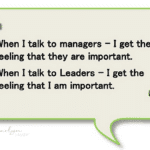Earlier this year, I had the opportunity to hear Dr. Eduardo Salas talk about team development. During his session, he made a statement that debriefs are a “simple and underutilized strategy” in team dynamics.
I’m a fan of a good debrief. And I believe being able to conduct an effective debrief takes planning. You just can’t “wing” a debrief. So I reached out to Dr. Scott Tannenbaum, president of The Group for Organizational Effectiveness (gOE), an organizational development consulting and research firm. He’s the author of the blog “On Teams” and has over 25 years of experience with all types of teams in a wide variety of industries.
Dr. Tannenbaum, can you share with readers the definition of a debrief?
During a team debrief, team members reflect upon a recent experience, discuss what went well, and identify opportunities for improvement. They try to build a common understanding (e.g., about challenges and responsibilities) and establish agreements to ensure future success.
A debrief can be conducted at any time, for example at the conclusion of a work shift, mid-way through a project, or simply as a periodic check in. They are appropriate for any team that needs good teamwork: management teams, project teams, sales teams; really any work team. We’ve even run them with medical teams, military teams, and NASA.
Why should a company want to debrief well? Do you have any research that supports the impact of debriefs on the business?
Research has shown that: 1) the majority of learning takes place on-the-job (not in training) but 2) simply having an experience doesn’t ensure that learning will occur.
Companies recognize the need for experiential learning but often don’t know how to promote it. They hope that a team will get better over time or that a person will benefit from an assignment; but unfortunately that doesn’t always happen naturally. Debriefs provide a mechanism for prompting, guiding, and promoting learning from experience.
We recently published a meta-analysis (a statistical analysis of all prior empirical studies on debriefing) that showed that teams that conduct debriefs perform an average of 20% better! That’s strong support for a relatively low-cost intervention.
How can someone create a good debrief? Are there steps or a formula for what makes up an effective debrief?
We’ve observed hundreds of debriefs over the years and noticed five common pitfalls:
- The leader telling the team what they need to do better rather than asking for their perspective
- Focusing strictly on task work (technical stuff) not on teamwork issues (how we worked together)
- Team members who felt they couldn’t weigh in or be heard
- Wasting time discussing areas of agreement and avoiding challenging topics
- Looking backward (reflect/discuss) but not forward (action plans/agreements)
So an effective facilitator (the team leader or an outsider) starts the debrief with a few ground rules, then asks the team for their observations about a recent experience — what happened, what went well and what didn’t. They provide ample structure to the discussion and ask questions to involve all team members and ensure they’ve considered teamwork challenges. A good debrief wraps up with a summary of lessons learned, and most importantly the establishment of tangible go forward plans – what the team will do in the future.
Is there any way to recover after a bad debrief?
Reflecting on your team’s experience and discussing how you want to work together differently going forward is usually a positive experience. But if you’ve conducted a debrief where you exhibited one or more of the pitfalls, I’d simply suggest that you learn from that experience and structure your next one a little differently.
Many thanks to Dr. Tannenbaum for sharing his experience and expertise with us. If you want to learn more about debriefs, Dr. Tannenbaum authored a chapter on conducting team debriefs in the book Developing and Enhancing Teamwork in Organizations: Evidence-based Best Practices and Guidelines and you can visit his website DebriefNow.com.
3







josh says
One point I would add to this – emphasis the “brief” in “debrief”. Focus on one or two key points. Understand that people have a limited bandwidth as they are dealing with multiple issues at anyone time and at the end of the day, many people are just happy being able to get their opinions heard
Sharlyn Lauby says
Hi Josh. Thanks for the comment. I agree that debriefs need to focused. There’s a fine line between a debrief and a gripe session. The person conducting the debrief needs to facilitate the conversation to make sure one doesn’t turn into the other.
I also received a comment on Twitter about who should conduct the debrief. It’s a great question. My thought is the person who will bring the most discussion. While a person of authority can certainly conduct the debrief, this needs to be balanced with how team members will respond. Will the group open up and give valuable, constructive insights? Or will they give the answers that the leader wants to hear? Personally, I don’t think there’s anything wrong with allowing different members of the team to conduct debriefs. It gives each person experience.
Scott Tannenbaum says
Josh: Thanks for the comment. I’d concur that the “brief” part of debrief is often important.
If a debrief becomes unfocused and rambling and no one helps guide the team to discuss what’s important, team members won’t want to participate in another debrief. Similarly, if the team never discusses possible changes, it can feel like a waste of time. So focus is important.
Regarding who should lead the debrief…I’ve seen successful debriefs led by team leaders, team members, internal facilitators, and external consultants. When a debrief is likely to be emotional, it can sometimes help to have someone from outside the team facilitate it. But for on-going team debriefs, it can be beneficial to have someone from the team lead it – if they have been provided with a reasonable debrief process they can follow.
elena ripamonti says
Thank you for this interview, there are some very interesting points.
About who should lead the debrief… I think it depends on the goal that you want to achieve through the debrief.
For example, if you want to review your processes, the debrief could be led by a team leader or someone else in the organization.
But if you think that training could be an occasion for knowing each other and sharing emotions and experiences, maybe the right person to lead the debrief is an external trainer.
He or she could link the training experience and the emotions felt by people with the methods used by the team, the team’s culture, the change sought etc.